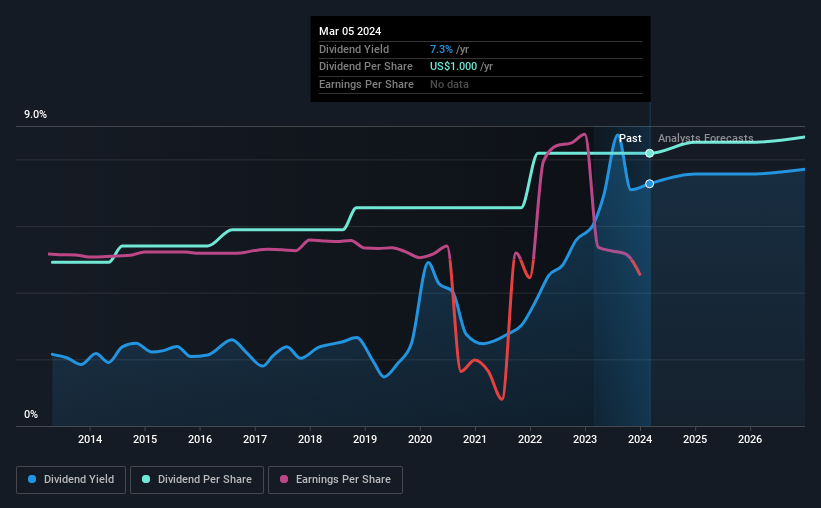Two Days Left To Buy Sinclair, Inc. (NASDAQ:SBGI) Before The Ex-Dividend Date
Regular readers will know that we love our dividends at Simply Wall St, which is why it's exciting to see Sinclair, Inc. (NASDAQ:SBGI) is about to trade ex-dividend in the next two days. The ex-dividend date is usually set to be one business day before the record date which is the cut-off date on which you must be present on the company's books as a shareholder in order to receive the dividend. The ex-dividend date is important because any transaction on a stock needs to have been settled before the record date in order to be eligible for a dividend. This means that investors who purchase Sinclair's shares on or after the 8th of March will not receive the dividend, which will be paid on the 25th of March.
The company's next dividend payment will be US$0.25 per share, on the back of last year when the company paid a total of US$1.00 to shareholders. Last year's total dividend payments show that Sinclair has a trailing yield of 7.3% on the current share price of US$13.76. We love seeing companies pay a dividend, but it's also important to be sure that laying the golden eggs isn't going to kill our golden goose! So we need to investigate whether Sinclair can afford its dividend, and if the dividend could grow.
View our latest analysis for Sinclair
If a company pays out more in dividends than it earned, then the dividend might become unsustainable - hardly an ideal situation. Sinclair's dividend is not well covered by earnings, as the company lost money last year. This is not a sustainable state of affairs, so it would be worth investigating if earnings are expected to recover. Given that the company reported a loss last year, we now need to see if it generated enough free cash flow to fund the dividend. If cash earnings don't cover the dividend, the company would have to pay dividends out of cash in the bank, or by borrowing money, neither of which is long-term sustainable. It distributed 45% of its free cash flow as dividends, a comfortable payout level for most companies.
Click here to see the company's payout ratio, plus analyst estimates of its future dividends.
Have Earnings And Dividends Been Growing?
Companies with consistently growing earnings per share generally make the best dividend stocks, as they usually find it easier to grow dividends per share. If earnings fall far enough, the company could be forced to cut its dividend. Sinclair was unprofitable last year, but at least the general trend suggests its earnings have been improving over the past five years. Even so, an unprofitable company whose business does not quickly recover is usually not a good candidate for dividend investors.
The main way most investors will assess a company's dividend prospects is by checking the historical rate of dividend growth. In the last 10 years, Sinclair has lifted its dividend by approximately 5.2% a year on average. It's good to see both earnings and the dividend have improved - although the former has been rising much quicker than the latter, possibly due to the company reinvesting more of its profits in growth.
Remember, you can always get a snapshot of Sinclair's financial health, by checking our visualisation of its financial health, here.
To Sum It Up
From a dividend perspective, should investors buy or avoid Sinclair? It's hard to get used to Sinclair paying a dividend despite reporting a loss over the past year. At least the dividend was covered by free cash flow, however. While it does have some good things going for it, we're a bit ambivalent and it would take more to convince us of Sinclair's dividend merits.
So while Sinclair looks good from a dividend perspective, it's always worthwhile being up to date with the risks involved in this stock. For example, Sinclair has 4 warning signs (and 1 which shouldn't be ignored) we think you should know about.
Generally, we wouldn't recommend just buying the first dividend stock you see. Here's a curated list of interesting stocks that are strong dividend payers.
Have feedback on this article? Concerned about the content? Get in touch with us directly. Alternatively, email editorial-team (at) simplywallst.com.
This article by Simply Wall St is general in nature. We provide commentary based on historical data and analyst forecasts only using an unbiased methodology and our articles are not intended to be financial advice. It does not constitute a recommendation to buy or sell any stock, and does not take account of your objectives, or your financial situation. We aim to bring you long-term focused analysis driven by fundamental data. Note that our analysis may not factor in the latest price-sensitive company announcements or qualitative material. Simply Wall St has no position in any stocks mentioned.

